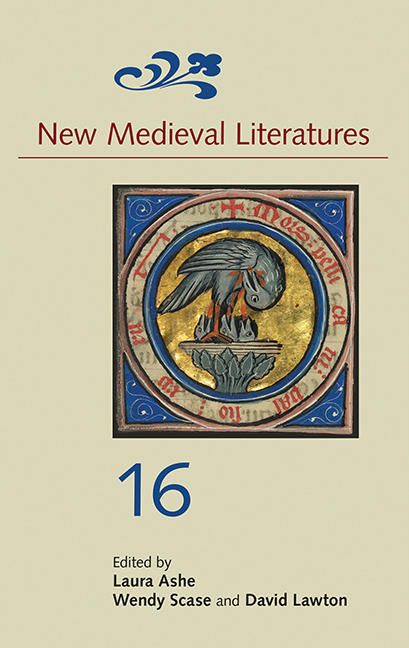Book contents
- Frontmatter
- Contents
- 1 The Book of the World at an Anglo- Norman Court: The Bestiaire de Philippe de Thaon as a Theological Performance
- 2 Monks, Money, and the End of Old English
- 3 Sustainability Romance: Havelok the Dane's Political Ecology
- 4 Locating the Border: Britain and the Welsh Marches in Fouke le Fitz Waryn
- 5 From disputatio to predicatio – and back again: Dialectic, Authority and Epistemology between the Roman de la Rose and the Pèlerinage de Vie Humaine
- 6 Mixed Feelings in the Middle English Charlemagne Romances: Emotional Reconfiguration and the Failures of Crusading Practices in the Otuel Texts
- 7 Circularity and Linearity: The Idea of the Lyric and the Idea of the Book in the Cent Ballades of Jean le Seneschal
- 8 ‘What shal I calle thee? What is thy name?’: Thomas Hoccleve and the Making of ‘Chaucer’
4 - Locating the Border: Britain and the Welsh Marches in Fouke le Fitz Waryn
Published online by Cambridge University Press: 05 July 2016
- Frontmatter
- Contents
- 1 The Book of the World at an Anglo- Norman Court: The Bestiaire de Philippe de Thaon as a Theological Performance
- 2 Monks, Money, and the End of Old English
- 3 Sustainability Romance: Havelok the Dane's Political Ecology
- 4 Locating the Border: Britain and the Welsh Marches in Fouke le Fitz Waryn
- 5 From disputatio to predicatio – and back again: Dialectic, Authority and Epistemology between the Roman de la Rose and the Pèlerinage de Vie Humaine
- 6 Mixed Feelings in the Middle English Charlemagne Romances: Emotional Reconfiguration and the Failures of Crusading Practices in the Otuel Texts
- 7 Circularity and Linearity: The Idea of the Lyric and the Idea of the Book in the Cent Ballades of Jean le Seneschal
- 8 ‘What shal I calle thee? What is thy name?’: Thomas Hoccleve and the Making of ‘Chaucer’
Summary
The Edwardian conquest of Wales in 1282–3 was culturally justified, in part, through the employment of a discourse asserting that Britain was a natural geographical and political unit. Geoffrey of Monmouth's Historia regum Britanniae, while often interpreted as an argument for the restoration of Welsh cultural pride, has also been read as a mythical paradigm for the political unity of Britain, and hence a contribution towards the ideology that validated English domination over totam insulam, the whole island. The Historia, however, is not alone in its exhibition of these dual drives. The Anglo- Norman text Fouke le Fitz Waryn, which draws heavily on the Historia, displays a similar tension; it creates a cultural and political identity for those living in the Welsh Marches, while implicitly advocating for the unity of England and Wales. Fouke has often been categorized as a ‘border story’, documenting the political, militaristic, and geographical matters pertaining to life in the Welsh Marches in the early years of the thirteenth century, as well as providing an account of the feats, both verifiable and utterly fantastical, of the ancestors of the Fitz Warins, a Marcher family. I argue, however, that while this text was written in the Welsh Marches, the Anglo- Welsh border zone, the text is only a border story in so far as it seeks to control the circumscription of geopolitical boundaries. Rather than reflecting the Marches’ historical position as a frontier area and envisaging its setting as ‘Englondes ende’, as the area is characterized in the Ancrene Wisse, Fouke imagines the March as the centre of a borderless Britain. This essay will first investigate how the text presents the Marches as a unique cultural, political, and mythological space, before exploring the construction of the relationships between the English and Welsh nobility. It will then examine how these elements contribute towards the ideology of Britain's unity through an examination of space and conquest.
There are limitations to applying historical interpretations to Fouke, primarily because its textual tradition prevents it from being dated with confidence. The extant, Anglo- Norman prose version of the text (London, British Library, MS Royal 12 C xii, fols 33–61) was probably written between 1325 and 1340 in Ludlow.
- Type
- Chapter
- Information
- New Medieval Literatures , pp. 109 - 134Publisher: Boydell & BrewerPrint publication year: 2016



